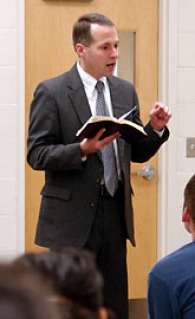The Graduate's Grind: Brigham Young University- Idaho
Religion and Reason: The Balance at BYU-Idaho
By. Jeffrey Howard

Many students experience a dilemma upon coming to a university. Their limited experience and mental immaturity impedes their capacity to sift through new ideologies and philosophies presented in their new situation, finding that the campus life presents questions and issues heretofore not encountered. In many ways, BYU-Idaho, like any other institution of higher education, functions as a stage whereon two separate entities, namely faith and reason, collide and combat, or co-exist and synthesize. Lowell L. Bennion, a former institute director, says, “When these two worlds meet: What happens? Sometimes there is an explosion; sometimes they seem like oil and water which do not mix; or again they may blend and enrich each other” (Bennion 10). BYU-Idaho provides a balanced education which partakes of both essential components, promoting the development of analytical thinking as well as a strong testimony of the restored Gospel. For this purpose, this campus offers religion classes to represent the necessary spiritual and faith-promoting portion of education.
The mission statement of the religion department of BYU-Idaho is “The study of religion is the core of academics at BYU-Idaho. It provides the basis for our very existence as one of the Lord’s universities, and every student is expected to make religion classes an integral part of their studies” (BYU-I religion home page). The religion faculty consists of 47 full-time and part-time employees who teach classes treating every volume in the Standard Works, as well as courses on eternal marriage, dating, provident living, Christian History, and World Religions, to name several. Bryce Cayton, a freshman student in Psychology, says, “I enjoy the classes that aren’t just from the standard works because they broaden the religious learning experience” (Personal Interview). Lindsay Fowler, an English major in her junior year, believes that the religion courses “increase spirituality” on campus.
The mission statement of the religion department of BYU-Idaho is “The study of religion is the core of academics at BYU-Idaho. It provides the basis for our very existence as one of the Lord’s universities, and every student is expected to make religion classes an integral part of their studies” (BYU-I religion home page). The religion faculty consists of 47 full-time and part-time employees who teach classes treating every volume in the Standard Works, as well as courses on eternal marriage, dating, provident living, Christian History, and World Religions, to name several. Bryce Cayton, a freshman student in Psychology, says, “I enjoy the classes that aren’t just from the standard works because they broaden the religious learning experience” (Personal Interview). Lindsay Fowler, an English major in her junior year, believes that the religion courses “increase spirituality” on campus.

In order to graduate with a bachelor’s degree from BYU-Idaho, a student must have enrolled in at least fourteen credits of religion. Four of these credits must be Book of Mormon classes; six must be scripture-based, such as Old Testament I and II, New Testament, and Doctrine and Covenants; and four must be other miscellaneous courses, such as a World Religions, Christian History, Genealogy, Provident Living, and Preparing for Eternal Marriage, to name several. The religion department even offers a course called Introduction to Mormonism for individuals on our campus who are not members of our church.
Ultimately, the purpose of enrolling students in religion courses, a program which consists of scripture-based or cultural classes, is the promotion of faith and balance in students whose university studies involve a great deal of exposure to secular thought. They need the secular facets of education, but they also need a dose of theology to keep them in educational equilibrium. Students need to learn to think critically, to ask questions about themselves and their belief systems, and figure out why they believe what they do; they also need to acquire stronger testimonies and augment their faith in God and Jesus Christ. BYU-Idaho allows students the opportunity to receive the best of both worlds in an ambience conducive to secular and spiritual education. As Professor Murray Hunt, M.A., a professor in English composition and logic, says, “The Gospel is about truth... Acquiring knowledge enhances our capacity to do” (Personal Interview). In other words, the purpose of the university to supply adequate training to future professionals is fulfilled through the religion department’s emphasis on the acquisition of testimony and theological depth, preparing students to enter the real world, ready and able to confront their chosen occupations by always keeping a steady hand on the rock of faith while dipping a sometimes hesitant toe in the cold waters of reason and reality.
Ultimately, the purpose of enrolling students in religion courses, a program which consists of scripture-based or cultural classes, is the promotion of faith and balance in students whose university studies involve a great deal of exposure to secular thought. They need the secular facets of education, but they also need a dose of theology to keep them in educational equilibrium. Students need to learn to think critically, to ask questions about themselves and their belief systems, and figure out why they believe what they do; they also need to acquire stronger testimonies and augment their faith in God and Jesus Christ. BYU-Idaho allows students the opportunity to receive the best of both worlds in an ambience conducive to secular and spiritual education. As Professor Murray Hunt, M.A., a professor in English composition and logic, says, “The Gospel is about truth... Acquiring knowledge enhances our capacity to do” (Personal Interview). In other words, the purpose of the university to supply adequate training to future professionals is fulfilled through the religion department’s emphasis on the acquisition of testimony and theological depth, preparing students to enter the real world, ready and able to confront their chosen occupations by always keeping a steady hand on the rock of faith while dipping a sometimes hesitant toe in the cold waters of reason and reality.
